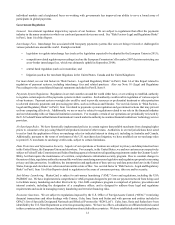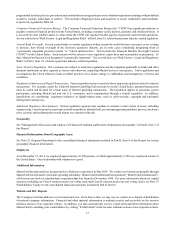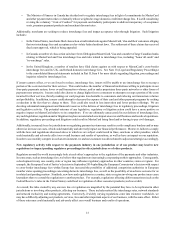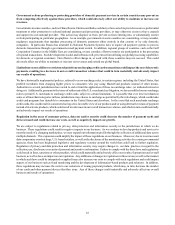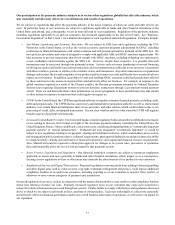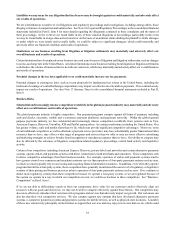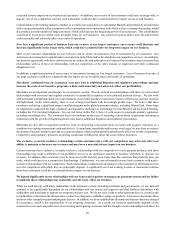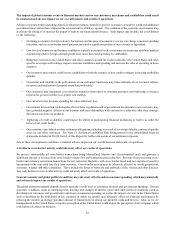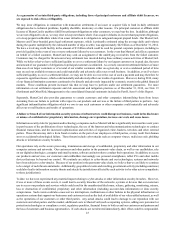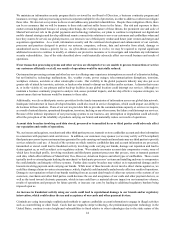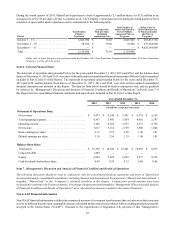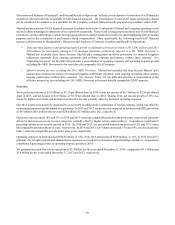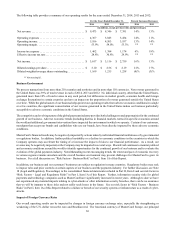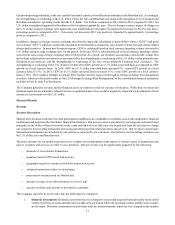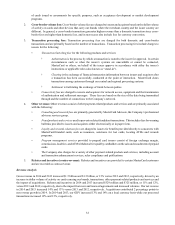MasterCard 2014 Annual Report Download - page 24
Download and view the complete annual report
Please find page 24 of the 2014 MasterCard annual report below. You can navigate through the pages in the report by either clicking on the pages listed below, or by using the keyword search tool below to find specific information within the annual report.22
The impact of global economic events in financial markets and on our customers, merchants and cardholders could result
in a material and adverse impact on our overall business and results of operations.
Adverse economic trends (including distress in financial markets, turmoil in specific economies around the world and additional
government intervention) have impacted the environment in which we operate. The condition of the economic environment may
accelerate the timing of or increase the impact of risks to our financial performance. Such impact may include, but is not limited
to, the following:
• Declining economies, foreign currency fluctuations and the pace of economic recovery can change consumer spending
behaviors, such as cross-border travel patterns, on which a significant portion of our revenues is dependent.
• Low levels of consumer and business confidence typically associated with recessionary environments and those markets
experiencing relatively high unemployment, may cause decreased spending by cardholders.
• Budgetary concerns in the United States and other countries around the world could affect the United States and other
specific sovereign credit ratings, impact consumer confidence and spending and increase the risks of operating in those
countries.
• Our customers may restrict credit lines to cardholders or limit the issuance of new cards to mitigate increasing cardholder
defaults.
• Uncertainty and volatility in the performance of our customers’ businesses may make estimates of our revenues, rebates,
incentives and realization of prepaid assets less predictable.
• Our customers may implement cost reduction initiatives that reduce or eliminate payment card marketing or increase
requests for greater incentives or greater cost stability.
• Our customers may decrease spending for value-added services.
• Government intervention, including the effect of laws, regulations and/or government investments in our customers, may
have potential negative effects on our business and our relationships with customers or otherwise alter their strategic
direction away from our products.
• Tightening of credit availability could impact the ability of participating financial institutions to lend to us under the
terms of our credit facility.
• Our customers may default on their settlement obligations, including as a result of sovereign defaults, causing a liquidity
crisis for our other customers. See Note 19 (Settlement and Other Risk Management) to the consolidated financial
statements included in Part II, Item 8 of this Report for further discussion of our settlement exposure.
Any of these developments could have a material adverse impact on our overall business and results of operations.
A decline in cross-border activity could adversely affect our results of operations.
We process substantially all cross-border transactions using MasterCard, Maestro and Cirrus-branded cards and generate a
significant amount of revenue from cross-border volume fees and transaction processing fees. Revenue from processing cross-
border and currency conversion transactions for our customers fluctuates with cross-border travel and our customers’ need for
transactions to be converted into their base currency. Cross-border activity may be adversely affected by world geopolitical,
economic, weather and other conditions. These include the threat of terrorism and outbreaks of flu, viruses and other diseases.
Any such decline in cross-border activity could adversely affect our results of operations.
General economic and global political conditions may adversely affect trends in consumer spending, which may materially
and adversely impact our results of operations.
The global payments industry depends heavily upon the overall level of consumer, business and government spending. General
economic conditions (such as unemployment, housing and changes in interest rates) and other political conditions (such as
devaluation of currencies and government restrictions on consumer spending, as well as the impact of events in the United States
such as deadlines on the debt limit) in key countries in which we operate may adversely affect our financial performance by
reducing the number or average purchase amount of transactions involving our payment cards and devices. Also, as we are
headquartered in the United States, a negative perception of the United States could impact the perception of our company, which
could adversely affect our business.


